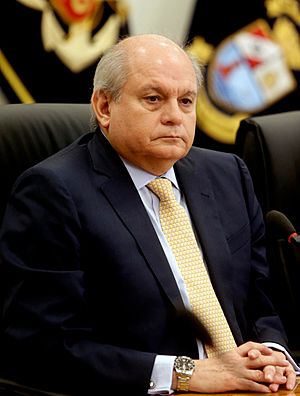Pedro Cateriano facts for kids
Quick facts for kids
Pedro Cateriano
|
|
|---|---|
 |
|
| Prime Minister of Peru | |
| In office 15 July 2020 – 6 August 2020 |
|
| President | Martín Vizcarra |
| Deputy | Diana Álvarez-Calderón |
| Preceded by | Vicente Zeballos |
| Succeeded by | Walter Martos |
| In office 2 April 2015 – 28 July 2016 |
|
| President | Ollanta Humala |
| Deputy | Manuel Mesones Castelo |
| Preceded by | Ana Jara |
| Succeeded by | Fernando Zavala |
| Minister of Defense | |
| In office 23 July 2012 – 2 April 2015 |
|
| President | Ollanta Humala |
| Prime Minister | Juan Jiménez Mayor César Villanueva René Cornejo Ana Jara |
| Preceded by | José Antonio Urquizo |
| Succeeded by | Jakke Valakivi |
| Deputy Minister of Justice | |
| In office 28 July 2001 – 21 June 2002 |
|
| President | Alejandro Toledo |
| Prime Minister | Roberto Dañino |
| Minister | Fernando Olivera |
| Preceded by | Juan Jiménez Mayor |
| Succeeded by | Alfredo Antonio Solf Montalve |
| Member of the Chamber of Deputies | |
| In office 26 July 1990 – 5 April 1992 |
|
| Constituency | Lima |
| Personal details | |
| Born | 26 June 1958 Lima, Peru |
| Political party | People's Liberty (2022–present) |
| Other political affiliations |
Independent (until 1987, 1993-2020) All for Peru (2020-2021) Liberty Movement (1987–1993) |
| Alma mater | Pontifical Catholic University of Peru (LLB) Complutense University (PhD) |
Pedro Álvaro Cateriano Bellido (born 26 June 1958) is a Peruvian lawyer and politician. He served as Prime Minister of Peru twice. His first term was from April 2015 to July 2016, under President Ollanta Humala. His second term was brief, from July to August 2020, under President Martín Vizcarra.
Before becoming Prime Minister, he was Peru's Minister of Defense. He held this role from July 2012 to April 2015.
Born in Lima in 1958, Pedro Cateriano studied law. He specialized in constitutional law, which is about the rules that govern a country. He has worked in law, teaching, business, and politics.
Contents
Early Life and Education
Pedro Cateriano was born in Lima, Peru, on June 26, 1958. His father was Pedro Cateriano Delgado, from Arequipa. His mother was Clara Bellido Delgado. His great-uncle, Andrés Neptali Cateriano y Alcalá, was a military officer who served as a minister.
He finished high school in 1975 at the Colegio de la Inmaculada. After that, he went to the Pontifical Catholic University of Peru to study law. He also did advanced studies at the Complutense University of Madrid in Spain, focusing on constitutional law.
Political Journey
Pedro Cateriano began his political career in the Peruvian Congress. He was a member of the Chamber of Deputies for Lima from 1990 to 1992. During this time, he was part of important committees, including those for the Constitution and Foreign Relations.
He became well-known for his work on a committee that investigated the government of former President Alan García. He later wrote a book about this investigation.
After the Congress was dissolved in 1992, he tried to get re-elected in 1995 but was not successful.
Working in Justice
In November 2000, after President Alberto Fujimori left office, Valentín Paniagua became president. Pedro Cateriano was then appointed to an advisory group for the Ministry of Justice. This group worked on changes to the country's constitution.
In July 2001, he became the Deputy Minister of Justice under President Alejandro Toledo. He served in this role until June 2002.
Minister of Defense Role
After working in the private sector for ten years, Pedro Cateriano returned to public service. In February 2012, he represented Peru in a human rights case.
On July 23, 2012, he was appointed Minister of Defense. He took over from José Antonio Urquizo. During his time as Defense Minister, he supported voluntary military service.
Challenges as Minister
As Defense Minister, Pedro Cateriano faced some challenges. There were discussions about how government decisions were made. He also faced criticism for supporting a rule about military service. This rule suggested a fee for those who didn't want to join the military. However, the Constitutional Court later said this rule was not allowed.
Serving as Prime Minister
Pedro Cateriano served as Prime Minister of Peru twice. This role is like being the head of the government's team of ministers.
First Term as Prime Minister (2015-2016)
On April 2, 2015, President Ollanta Humala appointed Pedro Cateriano as Prime Minister. He took over after the previous Prime Minister, Ana Jara, resigned. On April 27, 2015, he and his team of ministers received a vote of confidence from Congress. This meant Congress approved of his government. He served until July 28, 2016, when President Humala's term ended.
Second Term as Prime Minister (2020)
On July 15, 2020, President Martín Vizcarra asked Pedro Cateriano to become Prime Minister again. This happened during a time when the government was facing criticism for its handling of the COVID-19 pandemic in Peru.
Pedro Cateriano accepted the role and was sworn in. He met with leaders in Congress to ask for their support for his new team of ministers. However, on August 4, 2020, Congress voted against approving his cabinet. Because of this, he resigned after only twenty days in office. Walter Martos then became the new Prime Minister.
After His Premierships
On November 14, 2022, Pedro Cateriano announced that his new political party, People's Liberty, was seeking official registration. As of 2025, the party has many members and committees across Peru.
See also
 In Spanish: Pedro Cateriano para niños
In Spanish: Pedro Cateriano para niños
 | Jewel Prestage |
 | Ella Baker |
 | Fannie Lou Hamer |

